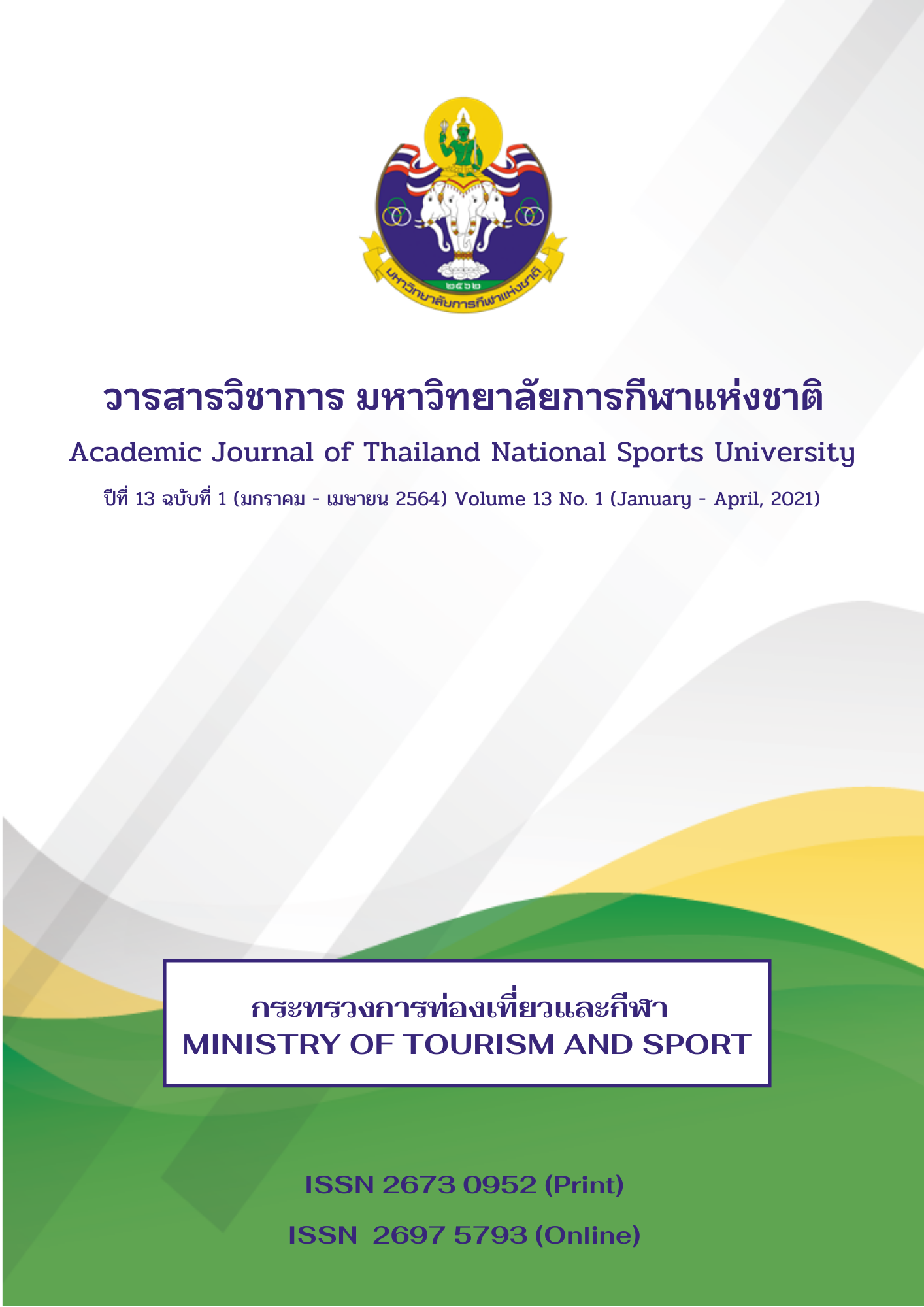THE NEEDS ASSESSMENT FOR ENHANCING COMPETENCY OF SECONDARY SCHOOL PE TEACHERS IN THE 21ST CENTURY
Main Article Content
Abstract
This study aimed to: 1) synthesize components of competency of secondary school PE teachers in the 21st century; 2) assess the needs for enhancing their competency and; 3) prioritize the needs for enhancing their competency. This research used a survey method to collect the data to assess the needs. The participants of this study were 395 nationwide secondary school PE teachers selected through multistage sampling. The research instrument was a questionnaire for needs assessment for enhancing competency of PE teachers in the 21st century. Descriptive statistics, t-test and Modified Priority Needs Index were used to analyze the data.
The findings revealed that there were six components of competency of PE teachers in the 21st century: 1) academic knowledge, teaching management, sport and exercise skills; 2) student development (student-centered learning); 3) interpersonal communication with students, parents, colleagues and school principals; 4) media, information and digital literacy; 5) personal development as a PE teacher; 6) adaptation to students and the changing world. The needs for enhancing competency of secondary school PE teachers were also found in all aspects, with the highest level of needs for media, information and digital literacy.
Article Details
The published article is a copyright of the Academic Journal of Thailand National Sports University. The passage appeared in each article in this academic journal is a perspective of each author which is not related to the journal. Each author is required to be responsible for all components of his/her own article. If there are any mistakes, each author must be responsible for those mistakes on his/her own.
References
Charoen Phuvichit. (2017). Development of teachers for the quality of learners in the 21st century. Retrieved from http://www.nidtep.go.th/webnidtep2015/files/170560_Teachers%20Development21.pdf
Cochran, W.G. (1953). Sampling techniques. New York: John Wiley & Sons. Inc.
Ministry of Digital Economy and Society. (2017). Digital Thailand. Bangkok: Ministry of Information and Communication Technology.
Passkorn Ruengrong et al. (2014). Educational technology vs Thai teachers in 21st century. Panyapiwat Journal, 5 (Special Issue), 195-207.
Pensri Srisawat et al. (2015). Model for Development of Professional Competencies of Physical Education Teacher in 21st Century in Educational Innovation and Information Technology. The Twelfth International Conference on e-Learning for Knowledge-Based Society, 11-12 December 2015, Thailand.
Piyanee Chitcharoen. (2014). Development of teachert raining process with a teachers network and design-based approach to enhance teacher competency in educational innovations and information technology (Unpublished doctoral dissertation), Chulalongkorn University.
Pranee Onsri. (2015). The instructor’s role towards 21st century learning skills. Journal of the Royal Thai Army Nurses, 16(3), 8-13.
Somkiat Kathongthung. (2013). A guideline for developing the competencies of physical education lecturers in the Institute of Physical Education for driving the ASEAN community (Unpublished master’s thesis), Chulalongkorn University.
Suwimon Wongwanit. (2005). Needs assessment research. Bangkok: Chulalongkorn University Publishing.
Vorasak Pianchob. (2005). Articles on philosophy, principles, pedagogy and measurement for evaluation of physical education. Bangkok: Chulalongkorn University Publishing.
Wanit Nirantranon and Sasithorn Nirantranon. (2008). The Trend of Pre – Service Physical Education Teacher In the Period of Fifteen Years (2008 – 2022). Retrieved from http://www.ipeud.ac.th/images/pulldown_1222762749/b.pdf
Wijarn Panit. (2012). The way to create learning for students in the 21st century. Bangkok: Tathata Public Company Limited.


